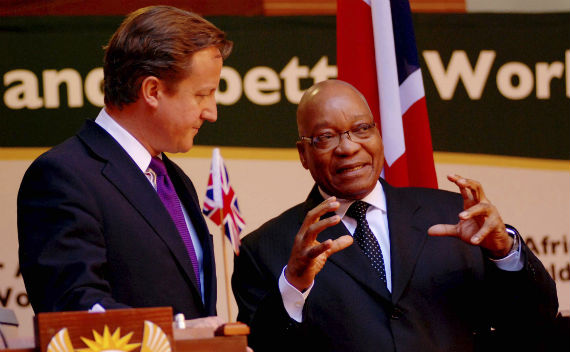Jacob Zuma’s Political Challenges
More on:

South Africa President Jacob Zuma is in a rough patch. Reuters is reporting that the South African police “may” reopen a corruption investigation against him involving a mineral rights and arms sale scandal that is more than a decade old. The ruling ANC’s partner, the Congress of South African Trade Unions (COSATU), publicly criticizes him for "zig-zagging" on economic and social issues and its spokesmen state that he should not “take for granted” its support in the 2012 elections for ANC party leader. The South African Communist Party (SACP), the third element in the ANC-led Tripartite Alliance, is increasingly critical of corruption among ANC leaders and the creation of a black bourgeoisie by the government’s black economic empowerment program that does little or nothing for the poor. The head of the ANC Youth League Julius Malema is calling for changes in the constitution so that white property could be expropriated and for “regime change” in neighboring Botswana, discomfiting the ANC’s leaders and resulting in the party’s secretary general public rebuking him. Malema’s comments may discourage international investors, though that is hard to prove. And the Zuma government reiterates that nationalization of the mines, as Malema advocates, is not government policy, nor is it something the government could even afford to do. Meanwhile, the formerly white Democratic Alliance, the official parliamentary opposition to the ANC, may be breaking out of its racial ghetto with speculation that its next party leader will be Cape Town Mayor Patricia de Lille, a charismatic “coloured” from the Western Cape with formidable political skills.
Zuma’s travails are underpinned by his government’s inability thus far to improve the situation of the country’s impoverished millions. The fall in commodity prices and the slow-down in economic activity world-wide means that that South African economic growth is not high enough to reduce unemployment. Yet only a rapidly growing economy can lift the majority of South Africans out of their poverty. There may also be a personal element. Mbeki lost in part because he was seen as “aloof”; Zuma’s polygamy is seen by many as unedifying and undignified. And, justified or not, he is tarred by the corruption brush.
The party leadership elections are more than a year away, in December 2012, and much can happen in the meantime. No credible political figure has yet emerged to challenge Zuma for the party leadership. (Malema is not credible to the senior ANC leadership.) Nevertheless, Zuma defeated his predecessor, Thabo Mbeki, as party leader in 2007. Mbeki then had to resign the presidency a few months later. In 2008, Zuma was supported by the Youth League, COSATU and the SACP. Zuma should be concerned about their apparent erosion of confidence in his stewardship.
More on:
 Online Store
Online Store
